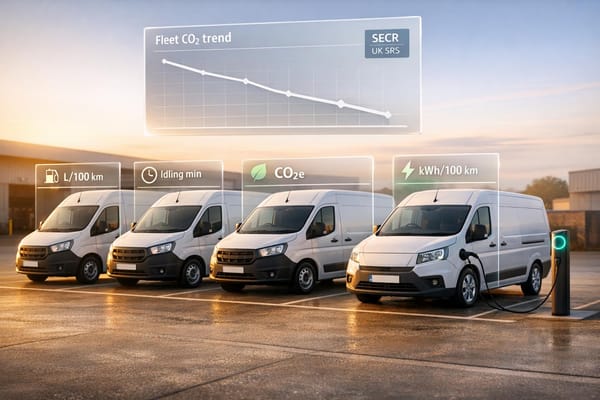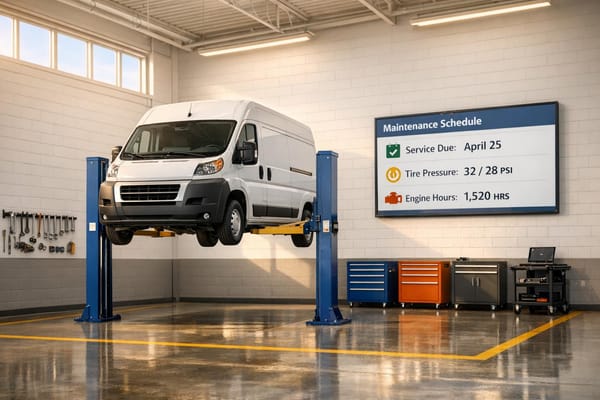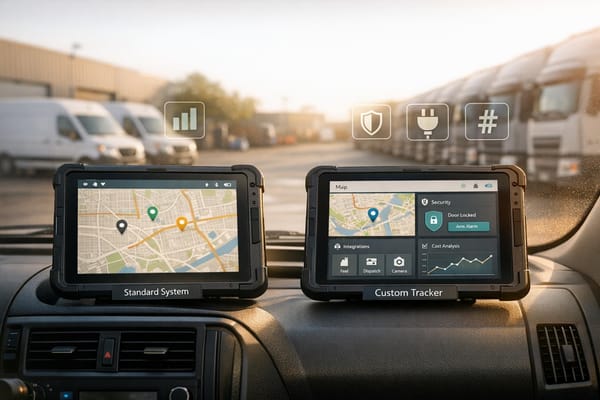Top 7 EV Tracking Solutions for Fleets
Explore the top EV tracking solutions for fleets, focusing on features that enhance efficiency, monitoring, and cost management.
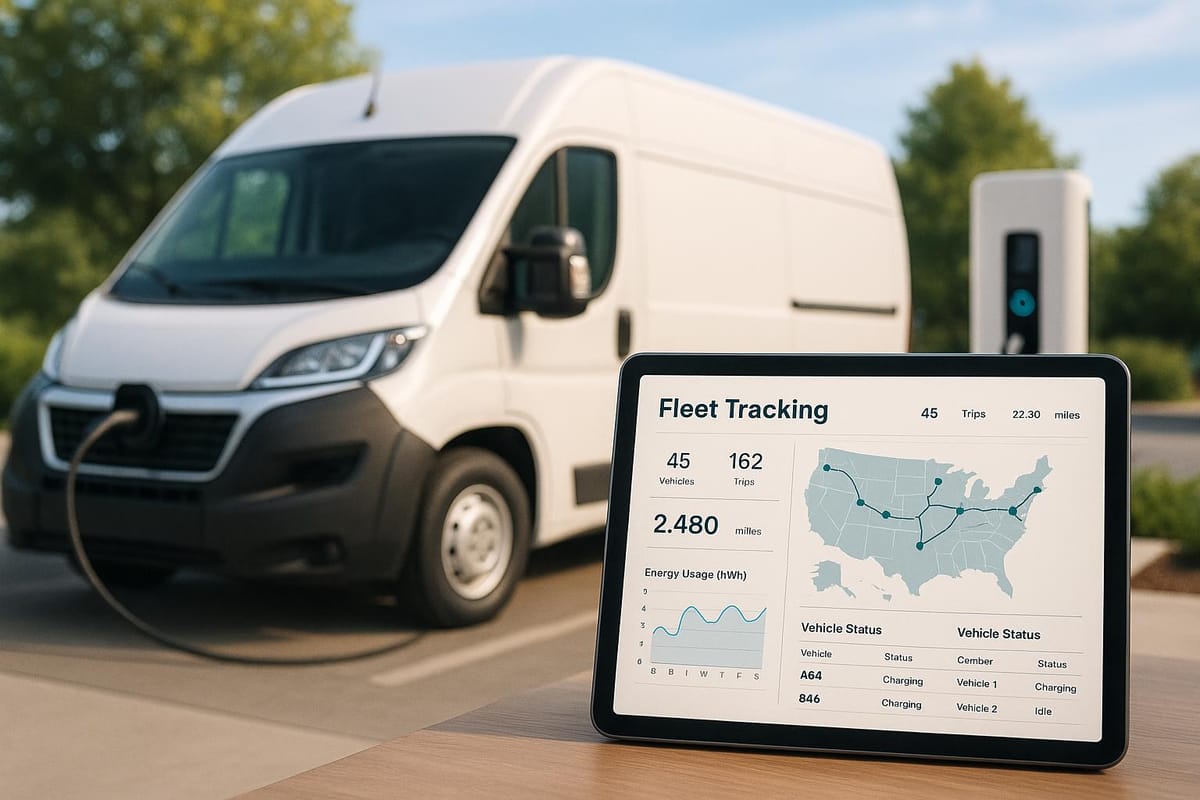
Managing electric vehicle (EV) fleets in the UK is no longer just about tracking location. Modern systems now optimise charging, monitor battery health, and reduce costs. Here’s a quick look at seven leading solutions for EV fleet tracking:
- GRS Fleet Telematics: Affordable (£7.99/month) with dual-tracker security and geofencing.
- Geotab: Processes vast data, integrates with charging infrastructure, and supports over 300 EV models.
- ElectrAssure: Focuses on charging management and offers rapid charger installation.
- SafeTrac Solutions: Provides driver behaviour monitoring and energy-saving tools.
- Quartix: Tracks real-time data, driver safety, and CO₂ emissions, starting at £9.90/month.
- FleetCheck: Offers EV lifecycle analysis and maintenance scheduling for £6/month.
- Teletrac Navman: Advanced tools for charging cost optimisation and safety analytics.
Quick Comparison
| Solution | Monthly Cost | Key Features | Security Options | UK Support |
|---|---|---|---|---|
| GRS Fleet Telematics | £7.99 | Real-time tracking, geofencing | Dual-tracker, immobilisation | 24/7 UK support |
| Geotab | £15-25 | Battery monitoring, charging integration | Driver behaviour monitoring | Local UK presence |
| ElectrAssure | £12-20 | Charging management | Basic security monitoring | UK-based support |
| SafeTrac Solutions | £10-18 | Route optimisation, range monitoring | Geofencing, theft alerts | Regional support |
| Quartix | £9.90-16.90 | CO₂ reports, fuel cost tracking | Real-time security monitoring | UK headquarters |
| FleetCheck | £6-15 | EV lifecycle tools, maintenance | Basic security features | UK-based team |
| Teletrac Navman | £20+ | Charging integration, safety tools | Basic security features | Global UK presence |
These tools help reduce costs, improve efficiency, and meet government regulations. Whether you need basic tracking or advanced charging insights, there’s a solution for every fleet size and budget.
Electric Vehicle Fleet Management Solution (UK)
How to Choose EV Tracking Solutions
Choosing an EV tracking solution requires features designed specifically for the unique demands of electric fleets. Unlike traditional vehicle tracking, these systems need to address areas like battery monitoring, charging efficiency, and energy management, alongside standard fleet management tasks.
At the core of any EV tracking system are real-time tracking and battery monitoring, which provide continuous updates on battery health, charging cycles, and energy use. For instance, telematics data shows that adopting smoother driving habits can cut energy consumption by up to 25% and enable off-peak charging schedules, reducing costs by as much as 45%. Madrid City Council demonstrated this by equipping its EV fleet with tracking devices, achieving a 160% improvement in charging efficiency and significantly lowering its environmental footprint.
"You cannot manage an electric fleet without telematics technology. Geotab's real-time and remote data is key to analyse the state of each vehicle and improve efficiency and sustainability."
– Enrique García, Technician, Department of Climate Change, Madrid City Council
Security features are equally important, given the high value of EV assets. Many advanced tracking solutions use dual-layer systems, combining wired GPS trackers with hidden Bluetooth units for added protection.
Route planning and driver safety tools can also improve operations while reducing costs. By monitoring driving behaviours like harsh acceleration and speeding, telematics systems can provide in-cab alerts that encourage safer driving. Studies reveal that such interventions can lower average CO₂ emissions from 838 g/km to 793 g/km - a 5% reduction - and predictive maintenance features can cut road incidents by 78%.
With the UK mandating that manufacturers sell 22% zero-emission cars and 10% zero-emission vans by 2024, increasing to 100% by 2035, compliance is becoming a critical consideration. EV tracking solutions help fleets meet these requirements by monitoring vehicle usage and ensuring the right mix of zero-emission vehicles.
"The extended ZEV timeline gives fleets space to take a more gradual and adaptive approach to EV adoption - whether that's rolling out charging infrastructure in stages, testing different makes and models to find the right ones for their need, or preparing drivers for the realities of new vehicle types."
– Chris Beeby, Director of Business Development at sopp+sopp
Integration with charging networks is another key feature, allowing fleets to optimise charging schedules. Charging during low-tariff hours can save up to 45% on energy costs, while intelligent charging management can reduce expenses by 15%. Companies like OVO Energy use telematics to analyse journey lengths, vehicle dwell times, and usage patterns, helping them determine the best EV models and charger placements.
Energy reporting and analytics play a vital role in making informed decisions. Advanced reporting tools provide insights into vehicle locations, driver behaviour, energy consumption, and vehicle health. For example, Mitchells of Mansfield used historical telematics data - such as mileage, tail lift usage, and average speeds from their diesel fleet - to accurately forecast the energy needs of their EV fleet, avoiding unnecessary costs while maintaining battery performance.
As fleets grow, scalability becomes essential. Cloud-based solutions, which currently dominate 76% of the European EV fleet management market, offer modular designs that can adapt to business expansion without major infrastructure changes. These platforms are projected to grow at an annual rate of over 18.5% from 2025 to 2034, providing real-time data access across multiple locations.
"Businesses need charging solutions that are not just functional today but adaptable for future growth."
– Adrian Sanchez, Director of Commercial & Industrial Sales at Starline
The most effective EV tracking solutions combine real-time data, strong security, efficient maintenance tools, and scalability. With the European EV fleet management market valued at £930.6 million in 2024 and expected to grow at a rate of 17.4% annually through 2034, selecting a solution that supports long-term growth is critical for sustained success. The following top solutions showcase how leading providers are meeting these demands.
1. GRS Fleet Telematics
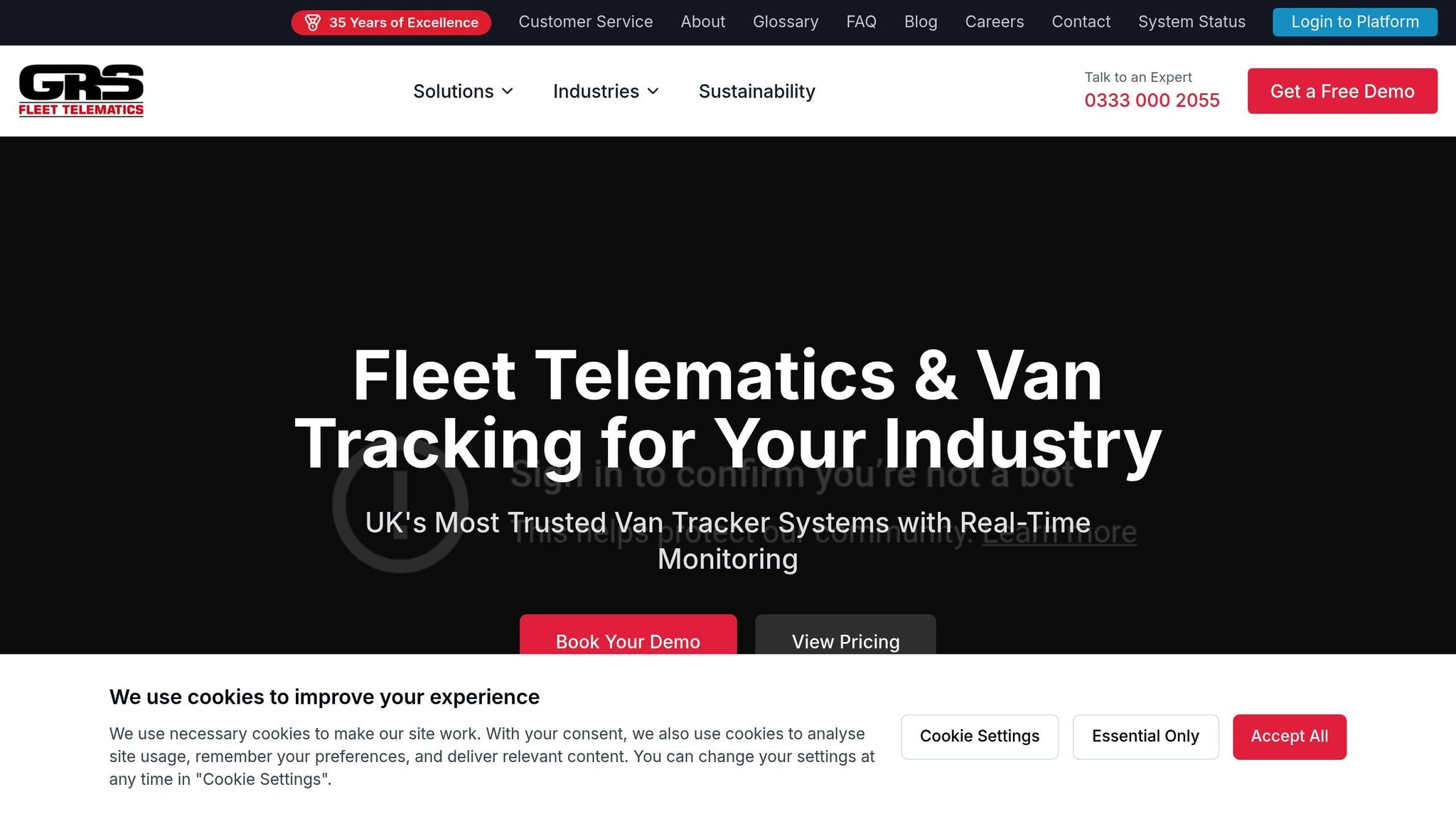
GRS Fleet Telematics is a UK-based tracking solution tailored specifically for electric vehicle (EV) fleets. It combines affordability with advanced security features, addressing key challenges like battery range and charging efficiency.
Real-time tracking and monitoring
With real-time GPS tracking, GRS Fleet Telematics allows fleet managers to monitor vehicle location, speed, and status through both web and mobile apps. This instant access to live updates helps managers respond quickly to unexpected delays or route changes, ensuring efficient operations and optimised vehicle range.
The platform also includes geofencing tools, enabling users to set virtual boundaries around charging stations, customer locations, or restricted areas. Automated alerts notify managers when vehicles enter or leave these zones, streamlining charging schedules and keeping vehicles within range.
Its dual-tracker system combines a wired unit with a Bluetooth backup, ensuring uninterrupted monitoring and a 91% recovery rate. This dependable tracking integrates seamlessly with additional tools for safety and efficiency.
Driver safety and eco-driving insights
GRS Fleet Telematics monitors driver behaviour, tracking metrics like harsh acceleration, sudden braking, and excessive speeding. For EV fleets, this data is especially useful, as aggressive driving can significantly impact energy consumption and battery life.
The system also provides in-cab alerts to encourage eco-driving practices, helping drivers adopt habits that extend battery longevity and reduce energy usage.
Route optimisation tools further enhance efficiency by considering charging station locations and battery capacity. By analysing historical journey data, the platform suggests routes that minimise energy consumption while ensuring vehicles reach their destinations with sufficient charge.
Pricing and scalability for UK fleets
GRS Fleet Telematics delivers advanced features at a competitive price, starting at just £7.99 per vehicle monthly. This subscription includes SIM card data, access to the full platform, and a dedicated account manager, with no hidden fees.
Hardware options are available to suit different needs:
- Essential package (£35): Basic tracking.
- Enhanced package (£79): Dual-tracker security.
- Ultimate package (£99): Includes immobilisation features.
Free installation is offered when combined with fleet branding services through GRS Fleet Graphics, providing an added benefit for businesses aiming to maintain a professional image while implementing robust tracking. Additionally, the pay-per-recovery model eliminates upfront recovery costs, reducing financial risk for operators.
The platform’s design allows for seamless scalability, making it easy to integrate additional vehicles as businesses expand their EV fleets without requiring significant infrastructure changes.
"UK's Most Trusted Van Tracker Systems with Real-Time Monitoring" – GRS Fleet Telematics
With its blend of affordability, security, and adaptability, GRS Fleet Telematics is a practical solution for UK businesses managing EV fleets of all sizes.
2. Geotab
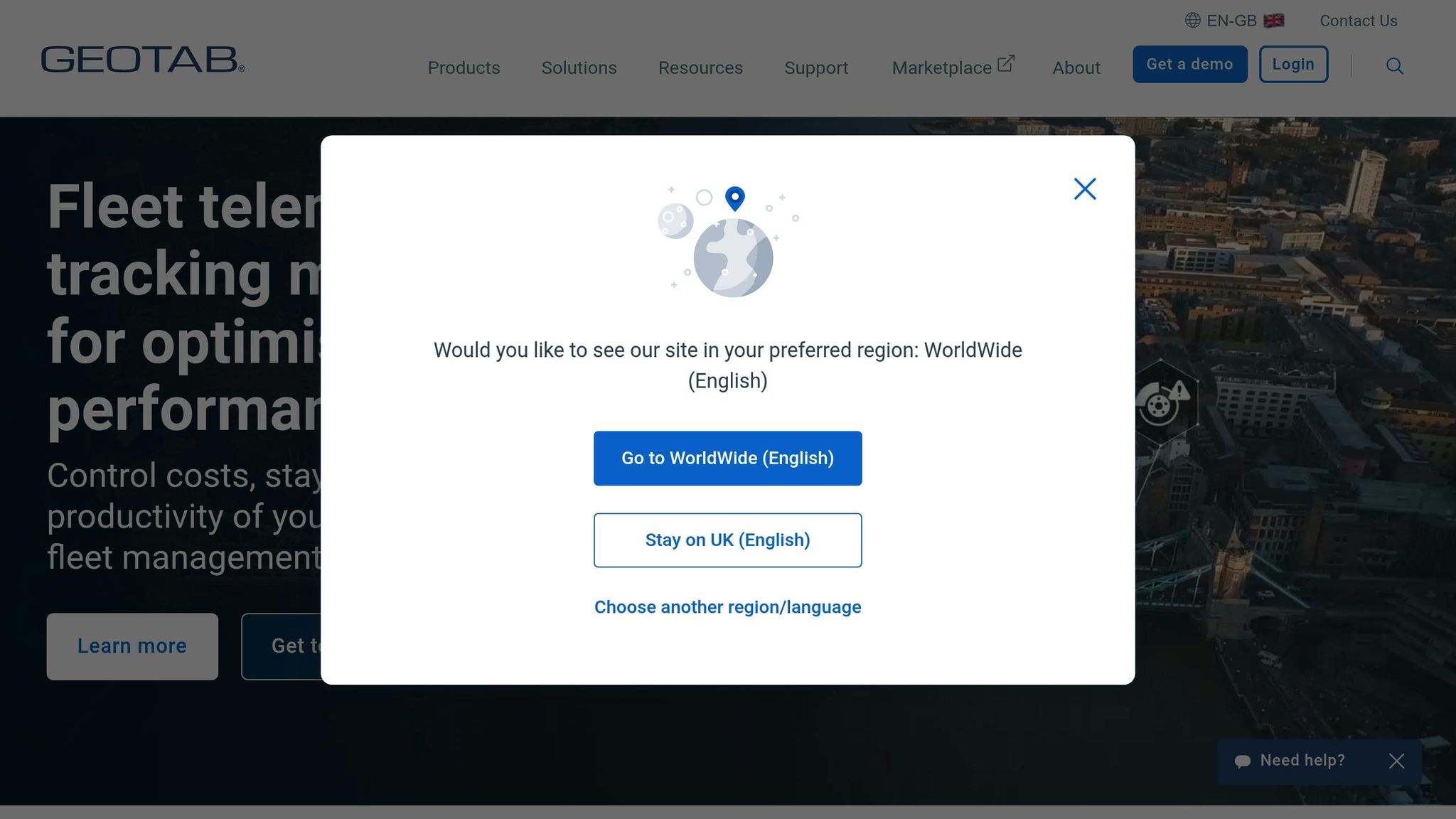
Geotab stands out as a telematics platform that processes an impressive 80 billion data points every day, supporting over 4.7 million vehicle subscriptions across the globe. It’s compatible with more than 300 makes and models of electric vehicles (EVs), making it a versatile solution for fleet management.
Real-time tracking and monitoring
At the core of Geotab’s system is the GO9 device, which connects to a vehicle’s OBD II port. This device captures essential data like location, speed, idle time, and mileage. Thanks to its advanced GNSS module, it delivers quicker latch times and improved accuracy in tracking.
Through the MyGeotab platform, fleet managers gain real-time visibility into their EV fleet. This includes map overlays displaying the current location, state-of-charge, and charging status for each vehicle. Additionally, the platform provides critical insights such as battery health and live charge levels, enabling more informed decision-making.
Managers can optimise operations by assigning EVs to routes based on their range estimates. They can also identify vehicles that aren’t charging when they should be, helping to minimise unexpected downtime. These tracking features integrate seamlessly with charging infrastructure for a smoother fleet management experience.
Integration with charging infrastructure
Geotab’s platform goes beyond tracking by offering robust integration with charging systems. Its open architecture allows it to connect with various charging infrastructure providers. For instance, in November 2022, Geotab partnered with Atom Power to launch a unified platform that delivers analytics on EV charging performance. This includes data on asset locations, charging times, peak management, and time-of-use insights.
"Our partnership with Atom Power is the next step in Geotab's continued commitment to support fleets throughout their electrification journey, whether they are fully electric, partial or have yet to begin the transition." – Eric Mallia, Vice President, Sustainability Business Solutions at Geotab
This integration eliminates the need for third-party tools to analyse charging data, reducing costs and improving operational efficiency. Fleet managers can also use the "Live Electric Vehicle Charging State" diagnostic to monitor when vehicles start and finish charging sessions, further enhancing operational control.
Geotab’s OEM platform adds another layer of functionality by incorporating proprietary data from manufacturers directly into MyGeotab. This gives fleet managers a detailed, unified view of their vehicles’ status and performance.
Driver safety and eco-driving insights
Geotab’s GO device collects and standardises data from over 9,000 different types of vehicles, including cars, vans, and trucks. This extensive data pool allows fleet managers to analyse driver behaviour and its influence on EV efficiency. The platform also includes the Fuel and EV Energy Usage Report, which helps track vehicle performance and identify areas for improvement, making it a valuable tool for optimising fleet operations.
Pricing and scalability for UK fleets
Geotab’s Electric Vehicle Suitability Assessment (EVSA) is designed to help businesses identify which vehicles in their fleet are best suited for EV replacement. This assessment takes into account the unique operational needs of each business, making the transition to EVs more manageable.
The platform’s open design supports continuous updates and integrations through the Geotab Marketplace, where fleet managers can find tailored EVSE solutions to fit their specific needs. With its strong partnerships with OEMs and its ability to support a wide range of EV makes and models, Geotab is well-equipped to handle fleet expansion or diversification without compromising performance.
Geotab’s capacity to process vast amounts of data daily ensures that it can keep up with the demands of growing fleets, making it a reliable choice for businesses scaling their EV operations.
3. ElectrAssure

Founded in 2013, ElectrAssure has made its mark by installing the first EV rapid chargers for major names like Uber and Volkswagen UK. The company also secured a £10 million contract with National Grid, showcasing its expertise in EV infrastructure.
Real-time tracking and monitoring
ElectrAssure’s fleet management software brings real-time tracking to the forefront. Its unified Charge Point Management System (CPMS) keeps tabs on vehicle performance, monitors charging status, and tracks battery levels. It even generates detailed reports to give fleet managers a clear picture of operational metrics.
The system also issues alerts for charger faults and allows remote control of charging devices. This means fleet managers can address issues quickly, monitor power consumption, and ensure chargers are running smoothly - all of which help maximise fleet uptime.
Integration with charging infrastructure
ElectrAssure provides a comprehensive EV fleet charging solution, covering everything from initial surveys to installation and ongoing maintenance. The company offers a wide selection of AC and DC chargers, including rapid chargers with capacities of up to 360kW. These chargers are versatile enough to support a range of vehicles, from electric trucks to eHGVs.
Thanks to its Remote SIM Provisioning (RSP) and the smart SIMPro platform, ElectrAssure enhances visibility and control over charging infrastructure. If issues arise, the system can redirect operations to an emergency back office, ensuring critical fleets stay operational.
"The gamechanger for us has been around visibility and demonstration of resilience and business continuity to customers with critical fleets" – Alun Davies, Operations Director at ElectrAssure
ElectrAssure’s CPMS seamlessly connects all elements of the EV charging ecosystem. This includes the site’s electrical supply, charging stations, charge points, vehicles, operators, and even the drivers themselves, creating a fully integrated system.
Pricing and scalability for UK fleets
ElectrAssure pairs its technical expertise with competitive pricing and scalable options, making it a strong choice for fleets of all sizes. The company also provides consultation on vehicle and infrastructure selection, as well as advice on funding options.
UK businesses can take advantage of government schemes offering grants of up to £15,000 per building or 75% of installation costs, which helps reduce initial expenses.
For hardware, fast (22kW) chargers are priced at £4,000, while rapid (50kW) chargers cost £20,000. This transparent pricing allows fleet managers to plan budgets effectively.
ElectrAssure also encourages early engagement with distribution network operators (DNO) to secure funding for electrical upgrades. Additionally, the company helps implement smart charging solutions that lower costs by scheduling charging during off-peak hours. With 24/7 support and maintenance packages, ElectrAssure ensures fleets stay operational and ready for expansion.
4. SafeTrac Solutions
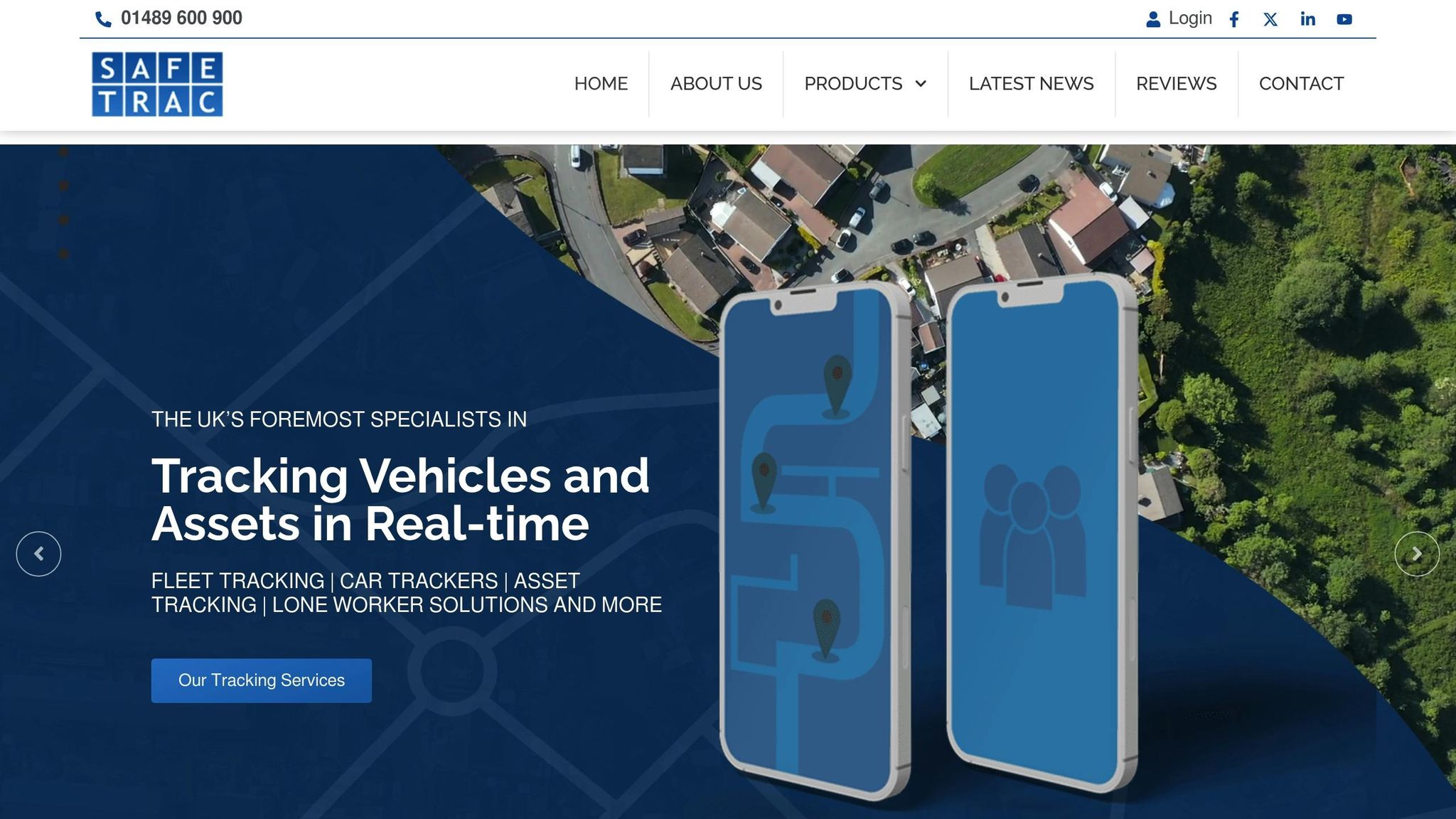
SafeTrac Solutions Ltd is a well-established provider of telematics services, catering to fleet operators across the South of England and throughout the UK. Their offerings are tailored to enhance efficiency, improve safety, and reduce operational costs, particularly for fleets transitioning to electric vehicles.
Real-time tracking and monitoring
SafeTrac's GPS tracking system provides live updates on vehicle locations, offering fleet managers complete visibility of their assets . Whether vehicles are stationary or in motion, this real-time tracking is invaluable for streamlining operational planning. By delivering instant updates, the system helps minimise downtime, boost productivity, and allow for quicker decision-making. This is especially beneficial for fleets operating across multiple locations in the UK. These tracking capabilities align with SafeTrac's broader commitment to driver safety and operational efficiency.
Driver safety and eco-driving insights
For electric vehicle fleets, SafeTrac's DriverCare system plays a key role in promoting safer driving while optimising energy use. The system evaluates driver behaviour, helping to improve performance and cut costs. Features like driver scorecards and GPS-enabled monitoring encourage better driving habits and foster a culture of safety within organisations.
A practical example comes from EC Piles, which adopted the DriverCare system to monitor their fleet and driver behaviours. The company benefited from real-time feedback on driving habits, access to detailed vehicle health data, and insights into energy consumption. These features led to reduced maintenance expenses and savings on fuel.
Research supports the effectiveness of driver coaching programmes, showing that eco-driving training can lead to long-term fuel savings of around 6%. Additionally, studies have found that improving driver scores by just one point can lower risky behaviours by 7%.
Pricing and scalability for UK fleets
SafeTrac Solutions combines advanced tracking and safety features with flexible pricing tailored to UK fleets of all sizes. Their van tracking solutions are particularly advantageous for businesses managing electric commercial vehicles, providing instant location updates via GPS. The company’s scalable approach allows fleet operators to start with basic tracking services and expand to include advanced features like driver behaviour monitoring and asset tracking as their needs grow. This flexibility not only helps reduce costs but also enhances efficiency and safety, making the transition to electric vehicles smoother for UK fleets.
5. Quartix EV Tracking
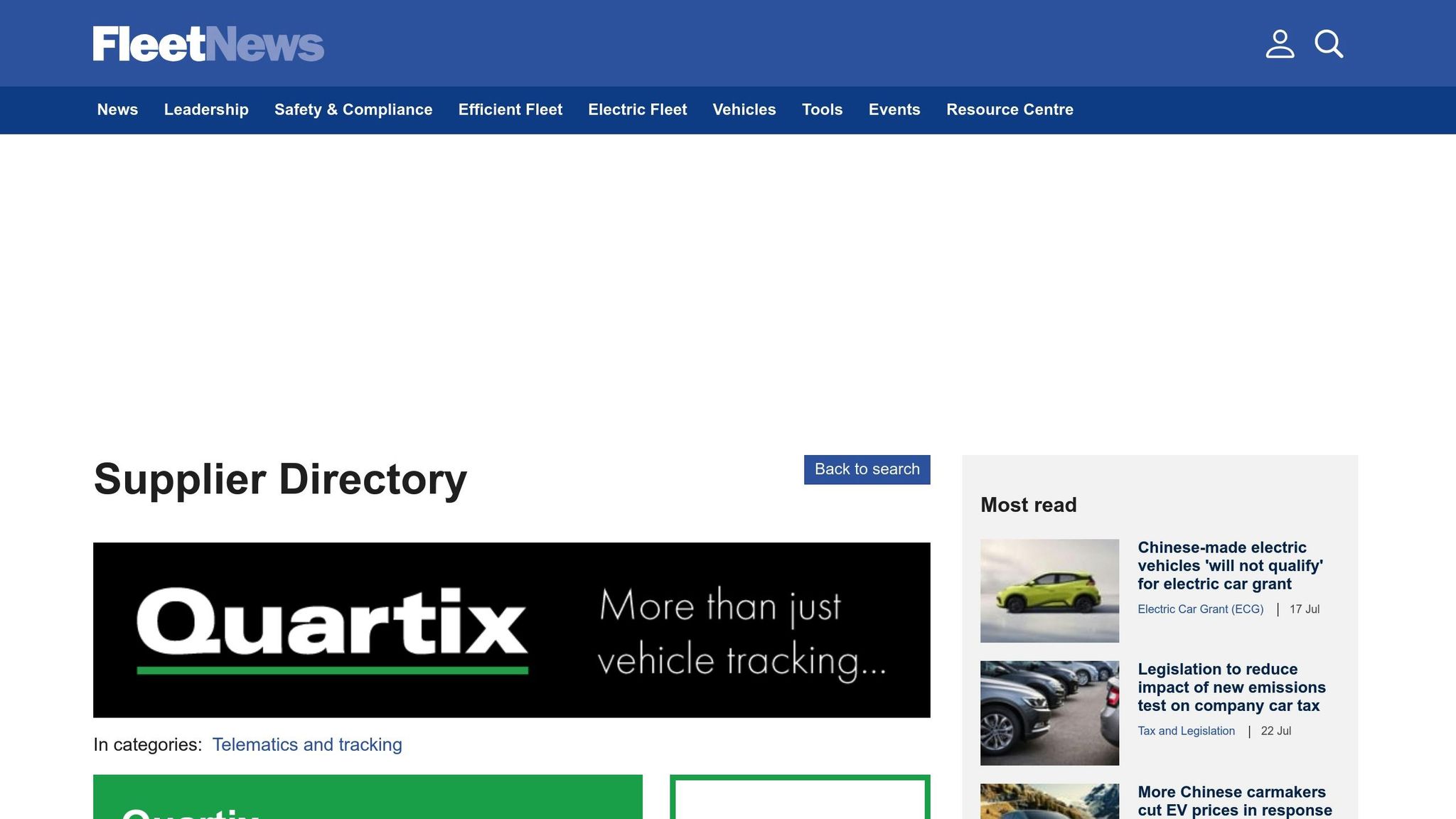
Quartix EV Tracking is designed to bring advanced tracking and analytics to electric vehicle (EV) fleets across the UK. By combining real-time monitoring with detailed insights, it helps fleet operators streamline operations and cut costs.
Real-time tracking and monitoring
Quartix provides live fleet visibility through web and mobile platforms, showing vehicle locations, usage patterns, and driver behaviour in real time.
But it goes beyond just tracking where vehicles are. Fleet operators receive daily driver logs detailing start and finish times, along with in-depth speed and idling reports for every driver or vehicle. The platform also features unlimited geofencing, sending instant alerts whenever vehicles enter or leave predefined zones within the UK.
Need to check whether a driver visited a specific location? Managers can verify site visits and optimise routes by reviewing movements based on postcode and date. This is particularly useful for electric vehicles, where range planning is critical.
"An instant snapshot of where any one of my vehicles is at any given time. It provides an accurate breakdown of the miles covered, the average speed, and whether or not they're using the most direct route." - Rygor Group Services
Studies show that effective fleet tracking can drive significant improvements: up to 25% less fuel usage, 15% fewer overtime claims, 10% shorter travel distances, 30% less idling, and a 20% boost in fleet utilisation. These features also pave the way for Quartix’s advanced driver safety tools.
Driver safety and eco-driving insights
Quartix doesn’t stop at tracking - it also focuses on improving driver safety. The platform generates reports with insights into speed patterns, acceleration, and braking to help fleet managers identify and address risky behaviours.
A standout feature is the Driver League Table, which ranks drivers based on their performance. Poor performers are flagged in red, while top drivers appear in green, encouraging healthy competition and improvement across the fleet.
For EV fleets, efficient driving is even more important. Quartix promotes smoother acceleration and braking, which not only extends battery range but also reduces risks. These adjustments can lead to fuel savings of 8% to 14%, translating into noticeable cost reductions.
"Quartix is all about seeing what your vehicles are doing and getting the best driving style out of your drivers. It enables you to reduce accident costs, maintenance costs and see a better fuel economy." - St Austell Brewery
Additionally, consistent safe driving practices can lower insurance premiums. Quartix provides detailed driving data that can support insurance claims and negotiations, offering proof of a company’s commitment to safety.
Pricing and scalability for UK fleets
Quartix offers three main plans - Info Point, Info Plus, and Info Drive - with increasing levels of functionality. For larger operations, there’s an Enterprise plan with tailored pricing and features.
Instead of direct online sign-ups, Quartix offers customised demonstrations. This hands-on approach ensures potential customers understand how the platform can meet their specific needs before making a decision.
Contracts are flexible, starting with a 12-month term and moving to a rolling agreement afterwards. Quartix is upfront about costs - there are no installation fees or setup charges, and all plans come with consistent support. For businesses looking to scale, the platform also offers API access and third-party integration to handle growing EV operations.
6. FleetCheck EV Management
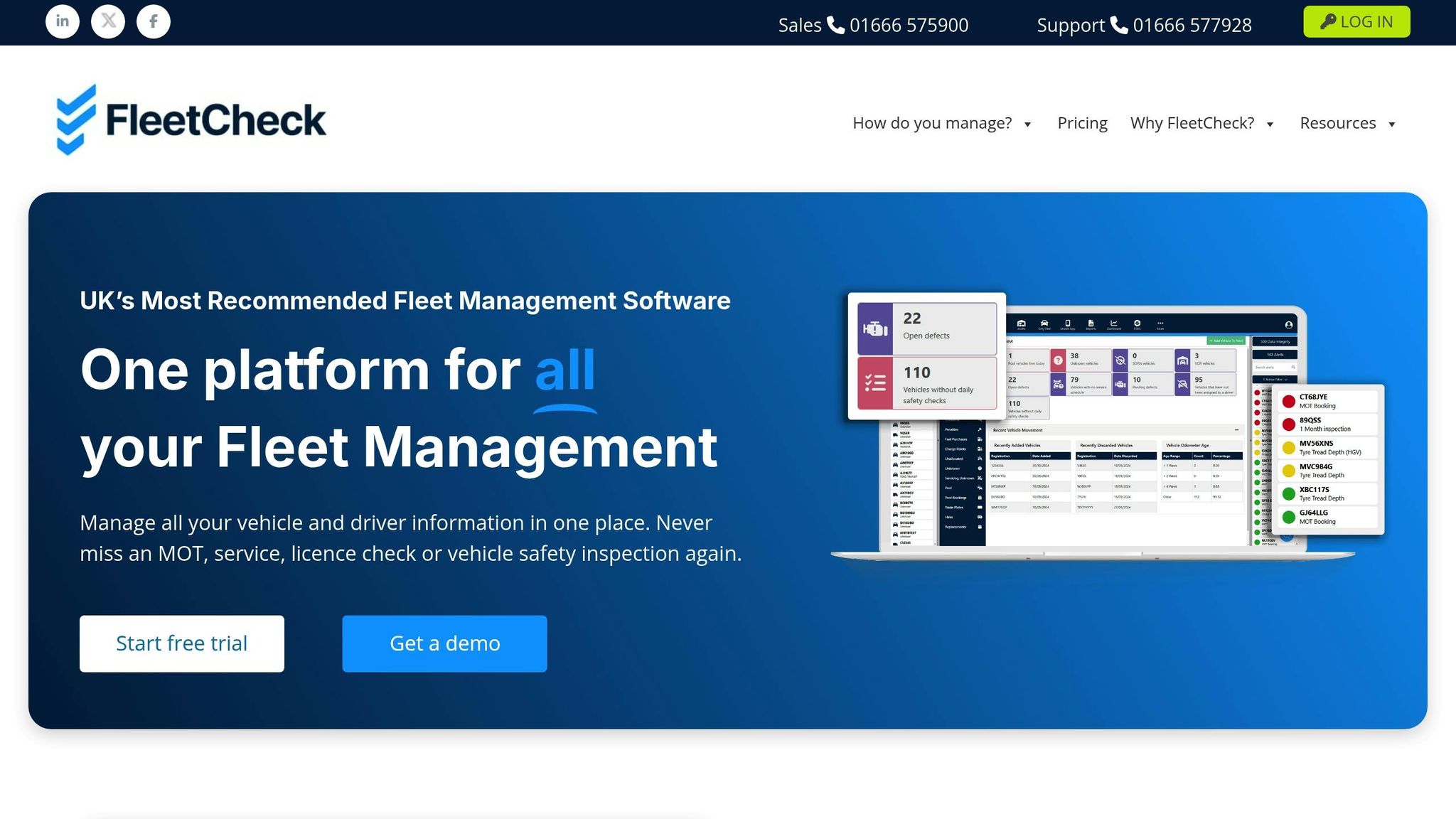
FleetCheck EV Management, trusted by more than 800 companies across the UK, combines traditional fleet management tools with specialised features for electric vehicles (EVs). This approach provides fleet managers with detailed insights into performance and costs.
Real-time tracking and monitoring
FleetCheck offers real-time GPS tracking, giving fleet managers a clear view of vehicle locations, trip histories, and performance data through an easy-to-navigate dashboard. By integrating data from various sources, the platform delivers comprehensive analytics to help streamline operations.
The system also includes a mobile app designed to simplify day-to-day fleet management. With features like walk-around checks and live status reporting, the app is especially useful for EV fleets, ensuring vehicles are regularly inspected and maintained to perform at their best.
"FleetCheck's award-winning software makes the job of managing a fleet easier... it helps you to stay in control, knowing everything you need to know with no nasty surprises." – FleetCheck
Another standout feature is its integration with over 250 data streams, allowing fleet managers to consolidate information from multiple sources into one manageable interface. This capability, combined with its EV-focused tools, addresses the unique challenges of managing electric fleets.
Integration with charging infrastructure
FleetCheck acknowledges the complexities of integrating EV charging data into fleet operations. Issues with importing data from both home and public chargers - whether through manual entry or API connections - can lead to gaps in operational and financial records. These interruptions can last anywhere from a few days to several weeks, often without warning.
Despite these hurdles, FleetCheck is prioritising improvements in this area, recognising the growing importance of accurate charging data as the UK's charging network expands.
"For fleets, who are now often operating significant numbers of EVs, getting hold of charger data is an increasingly important part of their cost and operational analysis, especially when it comes to reimbursing drivers for power used to charge their cars and vans at home and on the road." – Peter Golding, managing director at FleetCheck
Pricing and scalability for UK fleets
FleetCheck offers flexible pricing options to cater to fleets of all sizes. The platform’s most popular plan, the Professional plan, costs £6 per vehicle per month. Here’s a breakdown of their pricing structure:
| Plan | Monthly Cost | Minimum Fee |
|---|---|---|
| Driver | £2 per vehicle | £20 |
| Essential | £4 per vehicle | £40 |
| Professional | £6 per vehicle | £60 |
| Expert | £8 per vehicle | £80 |
The platform supports unlimited user access. For larger fleets, FleetCheck also offers an Enterprise system tailored for operations managing over 500 vehicles. In just six months, the company has onboarded more than 15 large fleets, each with over 500 vehicles, showcasing its ability to scale effectively.
To further enhance its utility, FleetCheck integrates with third-party tools like tracking systems, fuel cards, licence checking services, and tachograph analysis. For new customers, the platform provides a 14-day free trial for the Driver plan and 30-day free trials for the other plans, allowing fleets to explore its capabilities before committing.
7. Teletrac Navman EV Fleet Solutions
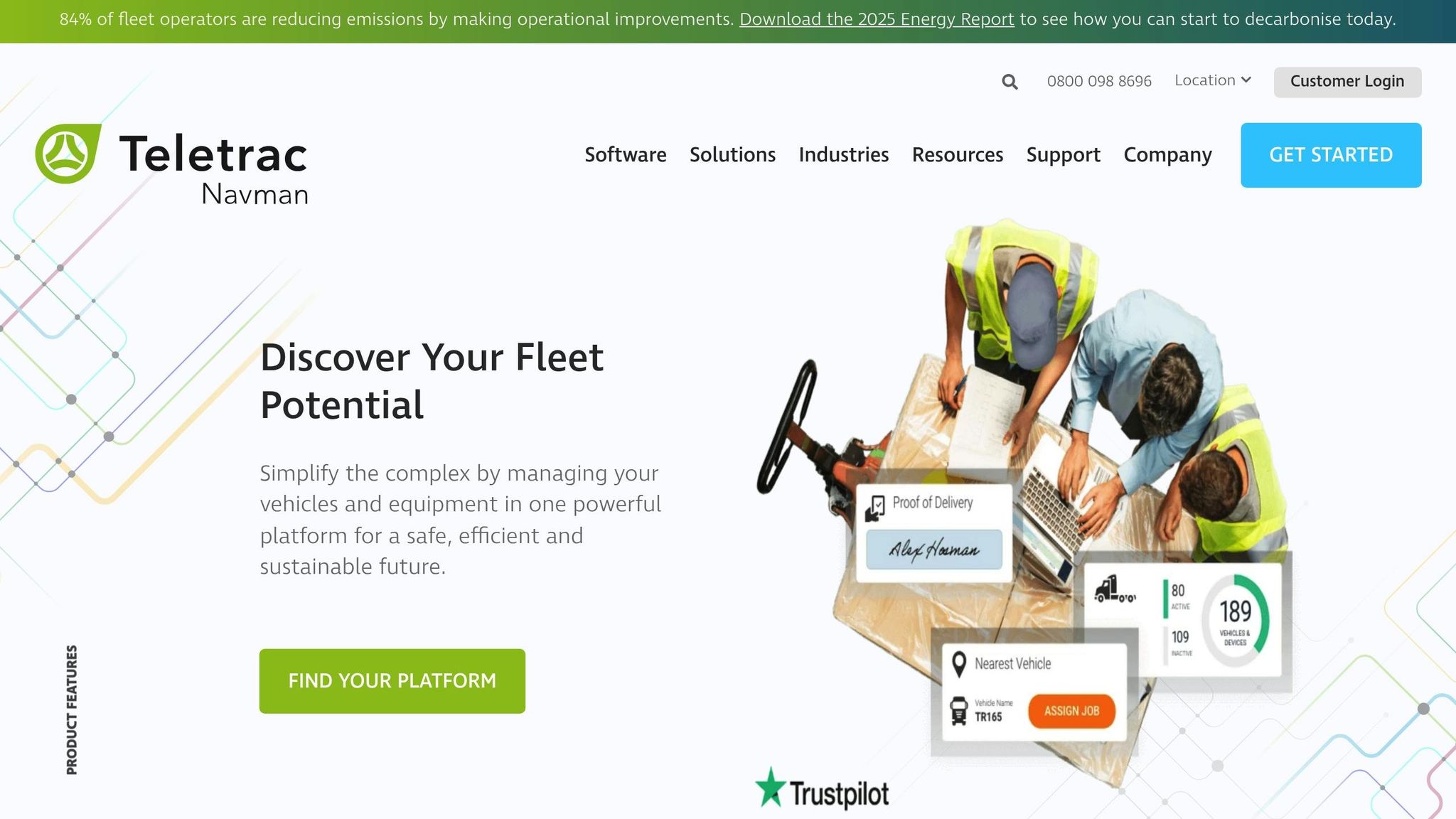
Teletrac Navman offers UK electric fleet operators a comprehensive management solution through its TN360 platform. This system centralises fleet operations, delivering second-by-second updates. Using the DIRECTOR interface, fleet managers gain real-time visibility into vehicle locations, driver performance, and operational status. The interface displays live data, including location, speed, driver details, and events for each vehicle, ensuring seamless monitoring.
The platform supports various installation options - professional, self-installed, or factory-installed units - that connect effortlessly to TN360. This integration streamlines job dispatch, maintenance alerts, and driver updates, creating a unified system to tackle the challenges of modern fleet management.
Teletrac Navman also addresses electric vehicle (EV) challenges with specialised tools like the Electric Vehicle Evaluator (EVE), which uses predictive analytics to optimise charging costs for fleets. The EV Readiness Tool, integrated with TN360, analyses fleet data to recommend the best EV adoption strategies and charger configurations.
Another key feature is EKOS (Energy Knowledge Operating System), which combines EV charging data with fleet and fuel management. This tool provides fleet managers with clear insights into energy consumption, charging expenses, and maintenance schedules.
Safety is another focus area of Teletrac Navman's solutions. Their safety analytics use a Google Maps interface paired with dashboard cameras to capture HD video during incidents like harsh braking or sharp turns. Driver scorecards help identify high-risk individuals and track overall fleet performance. Fleet operators have reported impressive results: a 53% reduction in safety violations, a 28% improvement in driver behaviour, and a 26% drop in accidents. For example, Aggregate Industries, which operates across 60 UK quarries, deployed the DIRECTOR platform across 1,160 LGVs. By using driver scorecards and league tables, they not only improved driving standards but also boosted staff morale through quarterly reward schemes.
"The ability to monitor driver behaviour has also promoted a safer driving culture and positively affected driver morale, with several reports of improved standards." – Russell Turner, Regional Logistics Manager, Aggregate Industries
For eco-driving, the platform tracks CO₂ emissions per mile and provides coaching to encourage sustainable driving practices. The "My Sustainability Journey" dashboard simplifies carbon emission reporting, helping fleets measure progress toward decarbonisation goals.
Teletrac Navman also offers flexible pricing to meet the needs of fleets of all sizes. Its scalable platform allows businesses to expand their telematics capabilities without losing historical data or switching systems. Implementation support includes guidance on setting goals, team communication, and ongoing performance reviews. According to a recent survey by Teletrac Navman, 79% of UK fleet operators anticipate that more than half of their vehicles will use alternative fuels within the next five years.
"In today's current business and economic climate, there are increasing pressures to operate more efficient and sustainable fleets. Being able to confidently plan and manage what are increasingly becoming mixed-energy fleets takes a unified approach to fleet management powered by smart data. With the power of EKOS we are continuing to equip fleets with the tools they need to simplify complex tasks and make sound business decisions that will impact them today and into the future." – Mayank Sharma, Head of Global Product Management & UX at Teletrac
Feature and Price Comparison
When choosing an EV tracking solution, comparing features and costs is essential. While all platforms offer real-time tracking and geofencing, the way these features are implemented varies significantly. Each of the seven systems has its own strengths, pricing models, and levels of support, making them suitable for different fleet needs.
Real-time tracking is a cornerstone of these solutions. GRS Fleet Telematics stands out with its dual-tracker technology, while others rely on standard GPS monitoring paired with geofencing. The table below highlights key comparisons, followed by a deeper dive into the details.
Charging integration is particularly important for electric fleets. Efficiently managing EV charging based on electricity price fluctuations can reduce costs by as much as 62%. Providers like Geotab and ElectrAssure focus heavily on battery monitoring and charging infrastructure management, providing fleets with up-to-date data on charge levels and battery health.
Security is another area where platforms differ. GRS Fleet Telematics, for example, offers immobilisation alongside its dual-tracker system, while others prioritise driver behaviour monitoring and theft prevention through geofencing and real-time alerts.
| Solution | Monthly Cost (per vehicle) | Key EV Features | Security Options | UK Support |
|---|---|---|---|---|
| GRS Fleet Telematics | £7.99 | Real-time tracking, geofencing | Dual-tracker, 91% recovery rate, immobilisation | 24/7 UK support |
| Geotab | £15-25 | Battery monitoring, charging integration | Driver behaviour monitoring | Local UK presence |
| ElectrAssure | £12-20 | Charging management | Basic security monitoring | UK-based support |
| SafeTrac Solutions | £10-18 | Route optimisation, range monitoring | Geofencing, theft alerts | Regional support |
| Quartix | £9.90-16.90 | CO₂ emission reports, fuel cost management | Real-time security monitoring | UK headquarters |
| FleetCheck | £8-15 | EV lifecycle analysis, maintenance scheduling | Basic security features | UK-based team |
| Teletrac Navman | £20+ | Real-time tracking, charging integration | Basic security features | Global with UK presence |
Pricing and Support Insights
Beyond features, pricing and support options further set these solutions apart. Monthly costs range from around £14 per vehicle for basic systems to as high as £499 for advanced solutions, particularly those designed for heavy-duty EV management. GRS Fleet Telematics is competitively priced at £7.99 per vehicle per month, which includes SIM data, account management, and hardware options starting at £35 for basic tracking, up to £99 for enhanced security packages.
For UK fleets, local support is a key consideration. Providers with dedicated UK-based teams help ensure timely assistance and smooth navigation of regional regulations. However, it’s important to account for additional costs, such as hardware installation, training, and system integration. Some providers include free installation when bundled with other services, while others charge separately for setup.
Customisation and Branding
Another notable feature is white-label capabilities. Some platforms offer fully rebrandable browser-based solutions, while others provide customisable mobile apps, allowing businesses to tailor the interface to their needs. This flexibility can be a deciding factor for companies looking to align their tracking systems with their branding.
Final Thoughts
Advanced EV tracking is reshaping fleet management in the UK by improving efficiency, enhancing security, and cutting costs. Take real-time GPS tracking as an example - companies using it report up to a 79% positive return on investment within just 12 months of adoption. On top of that, these systems deliver an average 25% reduction in fuel costs. These aren't just hypothetical numbers; they’re backed by real-world results.
For electric vehicle fleets, specialised tools that track battery levels, optimise charging schedules, and plan energy-efficient routes have proven benefits. A standout example is the Urban Logistics Fleet case study, which documented impressive outcomes: a 15% cut in charging costs, a 12% boost in battery life, a 20% increase in route efficiency, and a 25% drop in downtime - all achieved within a single year.
"The case study proves that integrating GPS tracking significantly enhances fleet performance and cost efficiency." – Andrew, Matrack
Security is another critical concern for UK fleet operators. With over 58,000 vehicles stolen in 2023 alone, advanced tracking systems like GRS Fleet Telematics’ dual-tracker technology and immobilisation features offer a 91% recovery rate. This provides operators with much-needed peace of mind.
But tracking systems offer more than just security; they also provide detailed insights into vehicle management. When evaluating a system, consider factors like GPS precision, diagnostic capabilities, and driver safety insights. It’s also essential to choose a platform that supports both EVs and traditional vehicles, ensuring comprehensive, real-time visibility across your entire fleet.
The financial advantages are hard to ignore. Advanced tracking can lead to a 17% reduction in accident-related costs and a 20% decrease in labour expenses. Plus, it helps manage fuel expenses, which can account for as much as 30% of operating costs.
To maximise these benefits, choose a tracking solution that aligns with your fleet’s size, budget, and specific EV needs. This approach will pave the way for a more efficient, secure, and cost-effective fleet operation in the UK.
FAQs
How can EV tracking solutions improve charging efficiency and help lower energy costs?
EV tracking solutions make charging smarter and more cost-effective. By automating charging during off-peak hours - when electricity rates are lower - they help fleets take advantage of cheaper energy tariffs. These systems also offer real-time energy consumption monitoring, allowing operators to spot trends and fine-tune their energy usage.
With better charging schedules and reduced energy waste, these tools can lead to noticeable savings on energy bills. At the same time, they ensure vehicles are always charged and ready to go, contributing to more efficient and eco-friendly fleet management.
What security features should an EV tracking solution have to safeguard valuable fleet assets?
To keep high-value fleet assets safe, an EV tracking solution needs a few key features. Real-time GPS tracking provides accurate location updates, making it easier to monitor vehicles at all times. Theft alerts play a crucial role by instantly notifying operators of any unauthorised movements. To safeguard data, advanced encryption is a must, ensuring information remains secure and tamper-proof. On top of that, physical security measures, like tamper-resistant devices, add another layer of defence. Finally, 24/7 monitoring offers round-the-clock oversight, enabling quick responses to theft or any suspicious activity.
How can EV telematics help improve driver behaviour and reduce fleet running costs?
Telematics systems in electric vehicles (EVs) play a crucial role in improving driver behaviour by providing real-time feedback on actions like speeding, harsh braking, and rapid acceleration. This kind of instant insight not only promotes safer driving but also encourages more responsible habits, ultimately reducing the likelihood of accidents.
Beyond safety, telematics data is invaluable for spotting inefficient driving practices, such as unnecessary idling or taking longer, less efficient routes. For fleet operators, this means an opportunity to cut down on energy use and reduce vehicle wear and tear. Tackling these inefficiencies can lead to lower maintenance costs and better fleet performance, translating into noticeable savings on operational expenses.

